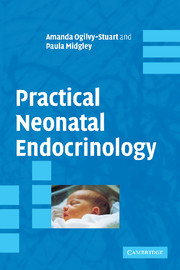Book contents
- Frontmatter
- Contents
- Acknowledgements
- Introduction
- 1 Hyperglycaemia
- 2 Hypoglycaemia
- 3 Management of hyperinsulinism
- 4 Hypoglycaemia in infant of a diabetic mother
- 5 Dysmorphic features
- 6 Micropenis
- 7 Hypopituitarism
- 8 Ambiguous genitalia (male): XY disorders of sex development
- 9 Cryptorchidism
- 10 Ambiguous genitalia (female): XX disorders of sex development
- 11 Pigmented scrotum
- 12 Adrenal failure
- 13 Collapse
- 14 Hypotension
- 15 Hyponatraemia
- 16 Hyperkalaemia
- 17 Hypernatraemia
- 18 Maternal steroid excess
- 19 Hypercalcaemia
- 20 Hypocalcaemia
- 21 Investigation and management of babies of mothers with thyroid disease
- 22 Maternal or familial thyroid disease
- 23 Goitre
- 24 Abnormal neonatal thyroid function tests
- 25 Hypothyroxinaemia in preterm infants
- Appendix 1 Calculation of glucose infusion rate
- Appendix 2 Dynamic tests
- Appendix 3 Normal ranges
- Appendix 4 Biochemistry samples
- Appendix 5 Formulary
- Index
16 - Hyperkalaemia
Published online by Cambridge University Press: 15 February 2010
- Frontmatter
- Contents
- Acknowledgements
- Introduction
- 1 Hyperglycaemia
- 2 Hypoglycaemia
- 3 Management of hyperinsulinism
- 4 Hypoglycaemia in infant of a diabetic mother
- 5 Dysmorphic features
- 6 Micropenis
- 7 Hypopituitarism
- 8 Ambiguous genitalia (male): XY disorders of sex development
- 9 Cryptorchidism
- 10 Ambiguous genitalia (female): XX disorders of sex development
- 11 Pigmented scrotum
- 12 Adrenal failure
- 13 Collapse
- 14 Hypotension
- 15 Hyponatraemia
- 16 Hyperkalaemia
- 17 Hypernatraemia
- 18 Maternal steroid excess
- 19 Hypercalcaemia
- 20 Hypocalcaemia
- 21 Investigation and management of babies of mothers with thyroid disease
- 22 Maternal or familial thyroid disease
- 23 Goitre
- 24 Abnormal neonatal thyroid function tests
- 25 Hypothyroxinaemia in preterm infants
- Appendix 1 Calculation of glucose infusion rate
- Appendix 2 Dynamic tests
- Appendix 3 Normal ranges
- Appendix 4 Biochemistry samples
- Appendix 5 Formulary
- Index
Summary
Clinical presentation
Incidental finding on blood biochemistry.
May be anticipated in the presence of oliguria associated with renal impairment.
Signs of cardiotoxicity:
widened QRS complexes or tall, tented T-waves on ECG;
dysrhythmias, such as ventricular tachycardia or fibrillation.
Definition
Blood potassium level >6.5 mmol/L.
Approach to the problem
Is the biochemistry result true? How was the sample collected, and could it have been haemolysed? Repeat the sample as a matter of urgency.
How many hours/days old is the infant? (Mild hyperkalaemia is not uncommon in extremely low birth weight (ELBW) infants in the first few days of life).
Review history for antecedents of renal impairment (asphyxia and birth trauma).
Is there a family history of renal problems? (e.g. polycystic kidneys).
Look for contractures (suggestive of reduced fetal urine output causing oligohydramnios).
Look for genital pigmentation (see Chapter 11) or ambiguity (see Chapters 8 and 10) suggestive of congenital adrenal hyperplasia.
Differential diagnosis
Spurious (haemolysed blood sample).
Renal impairment (including structural defects, e.g. urethral valves, dysplastic kidneys, and renal vascular accidents).
Tissue damage (especially in immature infants with extensive bruising).
Immaturity of renal potassium excreting capacity in ELBW infants.
Acidosis (causing shift of potassium out of cells into extracellular fluid).
[…]
- Type
- Chapter
- Information
- Practical Neonatal Endocrinology , pp. 105 - 110Publisher: Cambridge University PressPrint publication year: 2006

